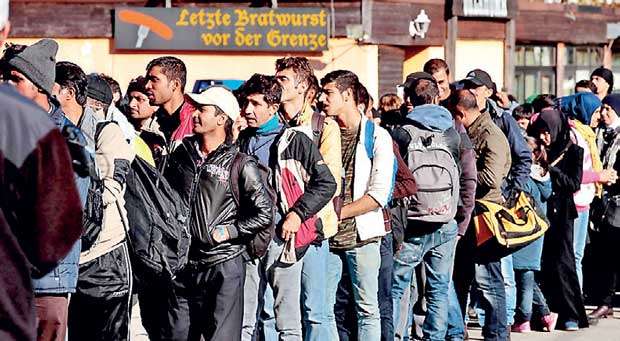15 Dec 2018 - {{hitsCtrl.values.hits}}

FRANKFURT AM MAIN (AFP) - Many among the more than one million people who arrived in Germany as migrants or refugees since 2015 are integrating speedily through work, the head of a key business group said yesterday.
“Today more than 400,000 are in employment or training... even I am surprised at how quickly it’s progressing,” Ingo Kramer, head of the Confederation of German Employers’ Associations (BDA), told the Augsburger Allgemeine newspaper.
“The vast majority are in jobs subject to social security contributions, and that integrates them into society,” he added. “Business leaders are getting it done.” Kramer’s optimistic tone matches that from the Federal Labour Agency (BA), which counts 30,000 young refugees currently in training.
But some 177,000 refugees were still registered as unemployed in November.
German Chancellor Angela Merkel chose in late summer 2015 not to close Germany’s borders to hundreds of thousands of people fleeing the Middle East and Africa.
The decision stoked support for the anti-immigration populist party Alternative for Germany (AfD), ultimately ushering a potent far-right political force into parliament for the first time since 1945 and weakening Merkel.
While the veteran leader stopped using the phrase “we can manage it” to reassure her people soon after the mass arrivals, Kramer said that “Merkel was right to believe that”.
Businesses in Germany are desperate for new workers, as with economic recovery the headline unemployment rate has sunk over the years to 5.0 percent, making available skilled labour increasingly scarce.
“Most young migrants can speak German so well after one year of study that they can follow classes in a vocational school,” Kramer said.
That was good news for “Mittelstand” small- and medium-sized firms -- often hailed as the backbone of the German economy -- in their search for employees, he added.
“We shouldn’t be afraid of migration but see people who come to us and work here as an enrichment” Kramer said.
Like other bosses, Kramer complained about frequent deportations of workers or trainees who arrived as refugees. Merkel’s conservatives have pushed through tougher immigration laws since 2015 in a bid to make up ground lost to the AfD.
Meanwhile, the German Institute for Human Rights highlighted in its annual report this month that foreigners are often underpaid, hired without formal contracts or pushed to work overtime with no pay.
16 Nov 2024 1 hours ago
16 Nov 2024 1 hours ago
16 Nov 2024 2 hours ago
16 Nov 2024 3 hours ago
16 Nov 2024 3 hours ago